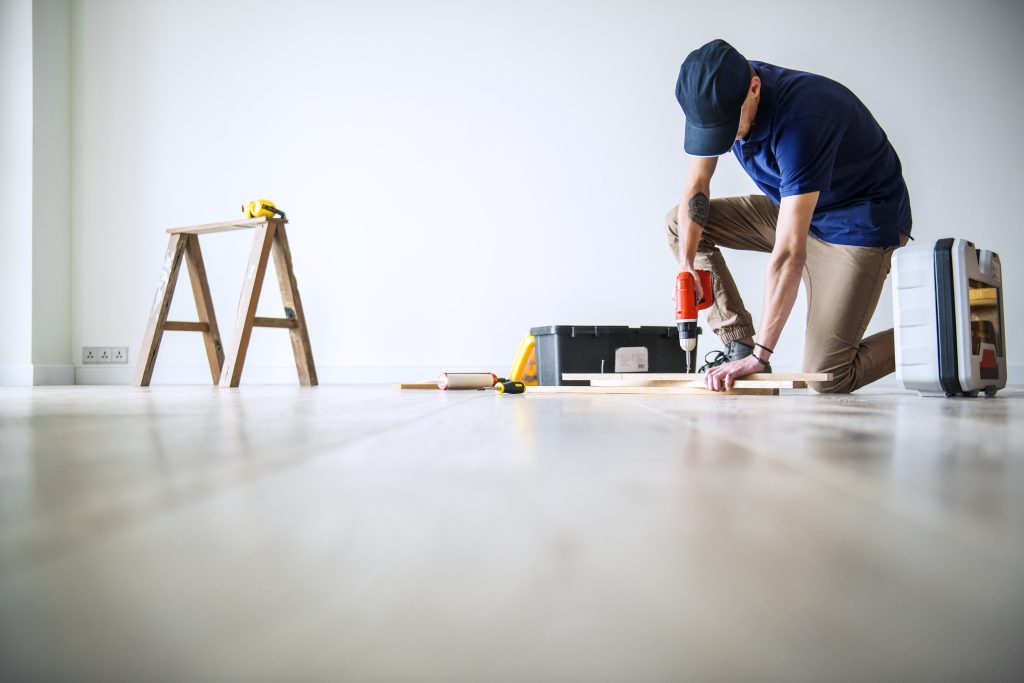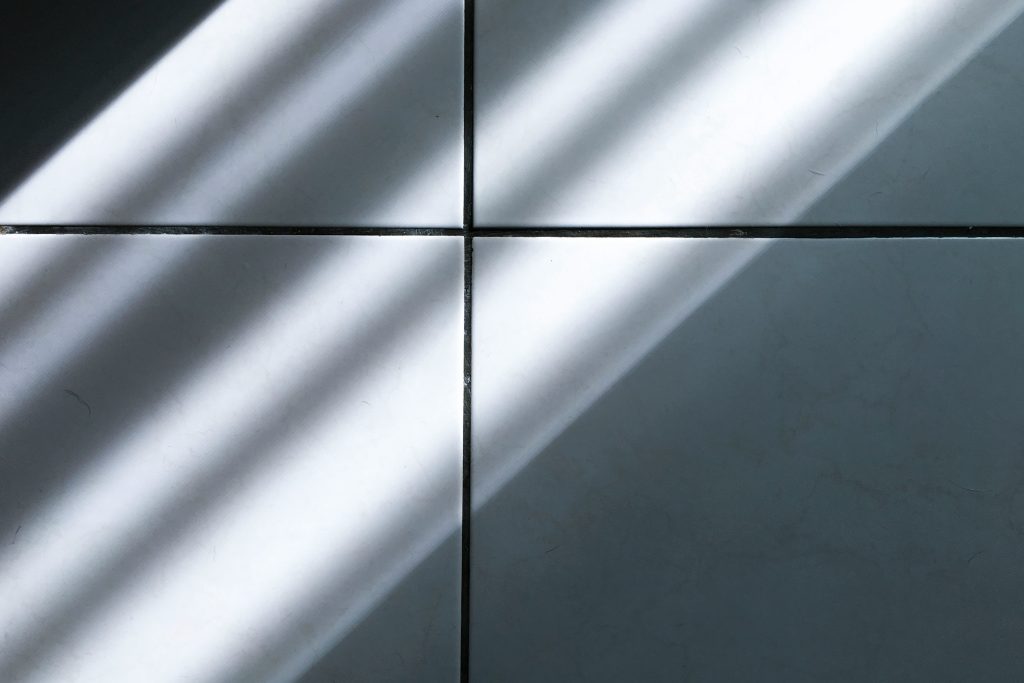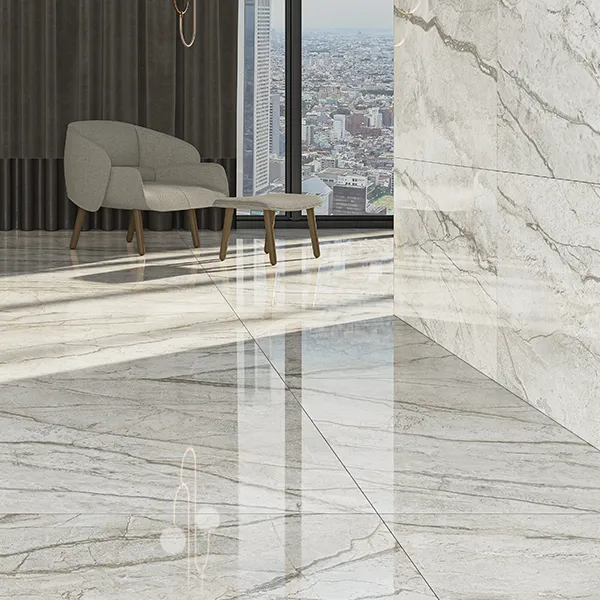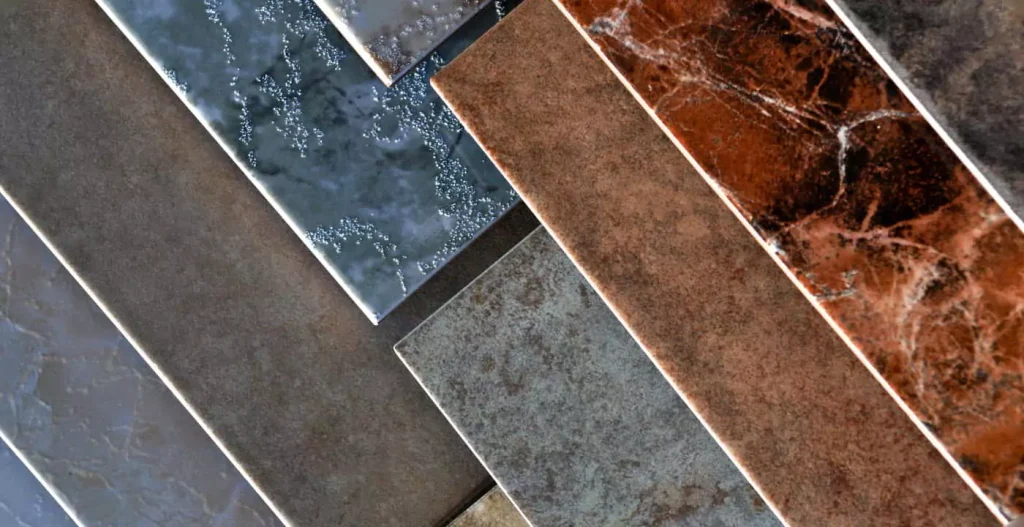Tile Flooring Installation
Looking for a timeless yet durable floor that compliments your home’s design while holding up to your chaotic household? Floor tile is the perfect material thanks to its density, durability, and versatility. It’s easy to care for and available in every shape, pattern, and color you can imagine.
Types of Floor Tile
You might already be familiar with the two main types of floor tiles, porcelain, and ceramic. But did you know that they’re so durable, they’re often used in outdoor settings? Both are clay tiles that provide impressive support for heavy traffic and have similar installation requirements. Plus, they repel water and are perfect for bathrooms, kitchens, and other high-moisture spaces.
Whether you’re looking for shower floor tile, mosaic tiles for a backsplash, or shower walls, tile can bridge the gap between beauty and practical durability in a bathroom. When it comes to kitchen floors, and tile in other areas of our home, the strong construction of both types of floor tiles leads to years of graceful, worry-free wear. No matter what room you’re looking to add a tile floor to, it’s important to understand the different types of tile before you choose. Then comes the hardest part – deciding what look you’d like for your interior.

Call for a FREE Estimate
Reach out to us today to discuss your flooring needs and discover why countless satisfied customers across Atlanta trust us for all their wood floor sanding and restoration needs! Contact us now to get started.

Tile Appearance
There’s more to ceramic and porcelain floor tiles than the neutral-hued basics we commonly see. Both types come in an array of shapes and sizes, from realistic, wood-like planks to hexagons and oversized rectangles. You can also incorporate other types of tile like mosaic tiles or natural stone into your flooring design. It’s easy to find a floor tile that meets your design vision, whether that’s a solid hue, unique pattern, or replica of a particular wood look or natural stone. That’s right, if you love the look of wood floors, you can now get a wood look in spaces where moisture is a concern.
Durability and Maintenance
Tile provides a tough, durable surface despite its delicate look. Both porcelain and ceramic tiles are extremely durable options, resisting scratches and the stress of the daily bustle of an active household. Tile performs well in high-traffic areas and provides lasting beauty in our home.
Ceramic and porcelain tiles require properly installed and sealed grout to fully resist water seeping down to the subfloor. Regularly sweep or vacuum your tile floors with a soft brush attachment and occasionally use a mop or sponge for a deeper clean. Since there are so many varieties of tile, be sure to check with the manufacturer for care instructions specific to the floor tiles you install.
Floor Tile Lifespan
With proper installation and care, porcelain flooring tiles can last decades, as can ceramic tile floors. For both types of tile, well-sealed grouting is imperative for long life, but that’s not the only factor. The longevity of your floor tiles will also depend on:
- How it’s installed and the quality of the materials used
- The amount of wear and tear the tiles receive
- How you care for and maintain the tile
- Whether you follow the manufacturer’s guidance
Before you make your final decision, make sure to ask about the warranty provided. High-quality warranty protection will ensure your new investment serves you well as long as possible.
Choosing the perfect tile can be difficult but choosing with our experts can be a big help. Millennium Flooring Solution can help you find the best tile materials to achieve the design style you want and stand up to your everyday life.

Floor Tile Installation
Tile installation of any kind can be a labor-intensive process. Ceramic and porcelain tile both adhere to the subfloor with glue, and the surrounding joints are filled with grout. Our professional installation team has the skill set, tools, and years of experience to complete the job efficiently and properly.
One thing to consider when looking at porcelain tiles is their weight. Generally, the weight of porcelain tile requires a sturdy and smooth subfloor, like a plywood underlayment or concrete slab, so it’s rarely used in a home’s upper levels.
Tile Flooring Cost
The cost of floor tile largely depends on the type of tile you choose, where you’re installing it, and who’s tackling the installation. Remember that the lowest prices often indicate lower quality tile. Be sure to understand the type of tile you are purchasing and make sure it will stand up to the expected use of the space. Higher-end and larger-sized tile products can cost more than standard floor tiles, but if that’s the look you love, they will be worth the investment and last for a long time. The area of the space you’re tiling will determine how much product you need and how long the job will take. The best way to budget for your tile project is to request a free tile estimate.
Pros and Cons of Flooring Tile
Tile offers clear advantages, including:
- Tile is incredibly durable, lasting for many decades
- There are many affordable tie options
- Tile is easy to clean and maintain
- Tile is beautifully versatile throughout your home.
On the other hand, tile floors do have some disadvantages:
- Tile can be cumbersome to install since they’re heavy and require sturdy support.
- You may not prefer the cool feeling of tile under your feet.
- Grout can sometimes be frustrating to keep clean.
Wall Tile
While much of the tile we install goes on the floors, there are many options for tile on the walls too. Tile’s water-resistant nature makes it perfect for backsplashes, showers, and other areas of your home that need a durable, waterproof surface that looks beautiful. Ceramic tile is the better option for most wall tile needs. Kitchen backsplashes, accent walls, and bathroom showers can benefit from this less heavy but still waterproof option. Just ensure that the ceramic tile you choose is clearly identified as suitable for water.
Wall tile is easy to clean and long-lasting, which explains its common use in kitchen backsplashes and shower and bath surrounds. There are many tiles, designs, and styles to choose from! A Millennium Flooring Solution expert can help ensure you find a gorgeous tile that meets the needs of your particular installation.
Porcelain vs. Ceramic Floor Tile
Both porcelain and ceramic floor tiles make perfect flooring options for busy areas in your house. In fact, they’re often mistaken for each other since they can look similar and are both made of clay. The main distinction between the two is their construction. Porcelain is made of a finer, purer clay mix that’s fired at a high temperature, making them dense. Both can be used in the same applications and locations, including kitchens, bathrooms, and mudrooms, among others.

